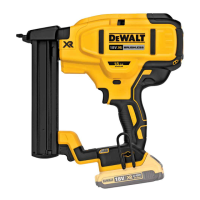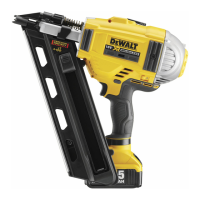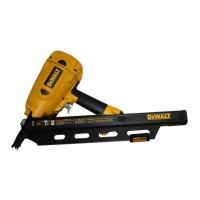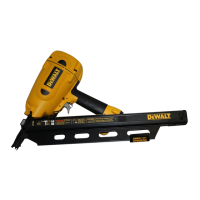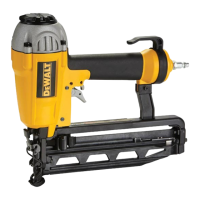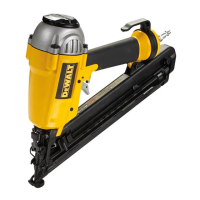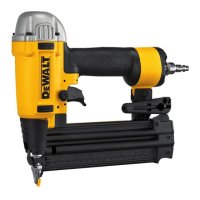37
ENGLISH
Description (Fig. A)
WARNING: Never modify the power tool or any part of it.
Damage or personal injury couldresult.
1
Trigger
2
Trigger lock-off
3
Depth adjustment wheel
4
Headlights/low battery/
stallindicator
5
Jam clearing latch
6
Contact trip
7
Sliding magazine
8
Bump/sequential
selectorswitch
9
Reversible belt hook
10
No-mar pad
11
No-mar pad storage
12
Stall release lever
13
Nail depth indicator
14
Battery
15
Battery release button
16
Magazine latch
17
Low nail indicator
Intended Use
Your cordless finish nailer has been designed for driving nails
into woodenworkpieces.
DO NOT use under wet conditions or in the presence of
flammable liquids orgases.
Your cordless finish nailer is a professional powertool.
DO NOT let children come into contact with the tool.
Supervision is required when inexperienced operators use
thistool.
• Young children and the infirm. This appliance is not
intended for use by young children or infirm persons
withoutsupervision.
• This product is not intended for use by persons (including
children) suffering from diminished physical, sensory or
mental abilities; lack of experience, knowledge or skills
unless they are supervised by a person responsible for their
safety. Children should never be left alone with thisproduct.
ASSEMBLY AND ADJUSTMENTS
WARNING: To reduce the risk of serious personal
injury, turn tool off and disconnect battery pack
before making any adjustments or removing/
installing attachments or accessories. An accidental
start-up can causeinjury.
WARNING: Use only
battery packs andchargers.
Belt Hook (Fig.A)
The cordless nailers include an integrated belt hook and can be
attached to either side of the tool to accommodate left- or right-
handedusers.
If the hook is not desired at all, it can be removed from thetool.
To Remove Belt Hook
1. Remove battery pack fromtool.
2. To switch the tool from right- to left-hand usage simply
remove the screw
19
from the opposite side of the tool and
reassemble on the otherside.
3. Replace batterypack.
WARNING: Remove nails from magazine before making
any adjustments or servicing this tool. Failure to do so may
result in seriousinjury.
CAUTION: When not in use, place tool on its side on
a stable surface where it will not cause a tripping
or falling hazard. Some tools with large battery packs
will stand upright on the battery pack but may be easily
knockedover.
Inserting and Removing the Battery Pack
from the Tool (Fig. B)
NOTE: Make sure your battery pack
14
is fullycharged.
To Install the Battery Pack into the Tool
Handle
1. Align the battery pack
14
with the rails inside the tool’s
handle (Fig.B).
2. Slide it into the handle until the battery pack is firmly seated
in the tool and ensure that you hear the lock snap intoplace.
To Remove the Battery Pack from the Tool
1. Press the release button
15
and firmly pull the battery pack
out of the toolhandle.
2. Insert battery pack into the charger as described in the
charger section of thismanual.
Fuel Gauge Battery Packs (Fig. B)
Some
battery packs include a fuel gauge which consists
of three green LED lights that indicate the level of charge
remaining in the batterypack.
To actuate the fuel gauge, press and hold the fuel gauge button.
A combination of the three green LED lights will illuminate
designating the level of charge left. When the level of charge
in the battery is below the usable limit, the fuel gauge will not
illuminate and the battery will need to berecharged.
NOTE: The fuel gauge is only an indication of the charge left on
the battery pack. It does not indicate tool functionality and is
subject to variation based on product components, temperature
and end-userapplication.
OPERATION
Instructions for Use
WARNING: Always observe the safety instructions and
applicableregulations.
WARNING: To reduce the risk of serious personal
injury, turn tool off and disconnect battery pack
before making any adjustments or removing/
installing attachments or accessories. An accidental
start-up can causeinjury.
Proper Hand Position (Fig. C)
WARNING: To reduce the risk of serious personal injury,
ALWAYS use proper hand position asshown.
WARNING: To reduce the risk of serious personal
injury, ALWAYS hold securely in anticipation of a
suddenreaction.
Proper hand position requires one hand on the main handle
asshown.
